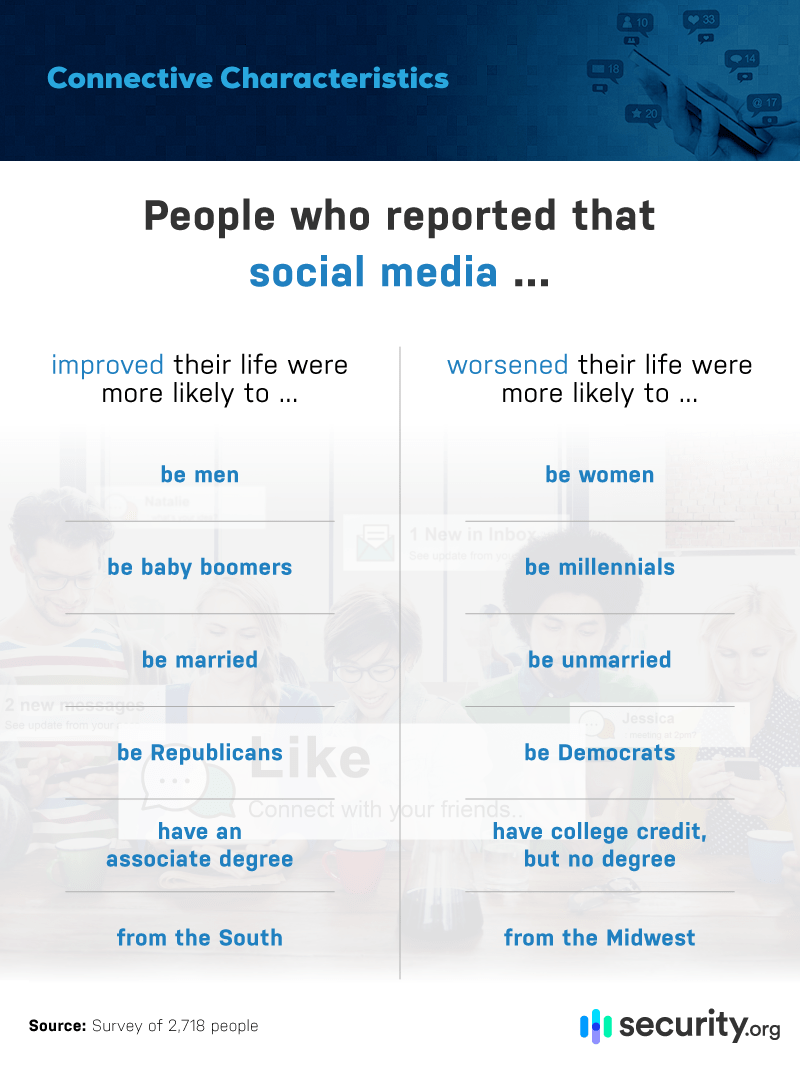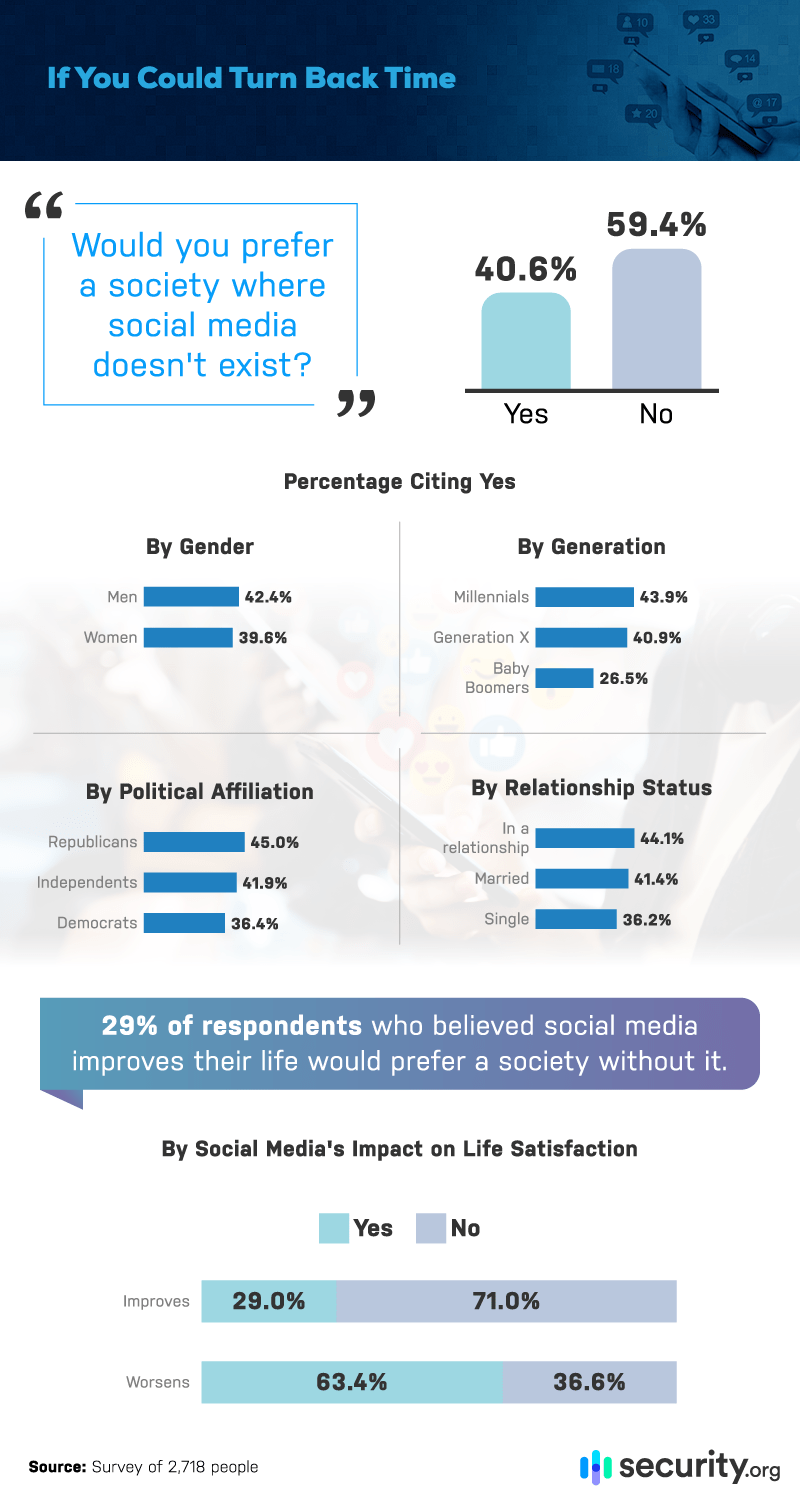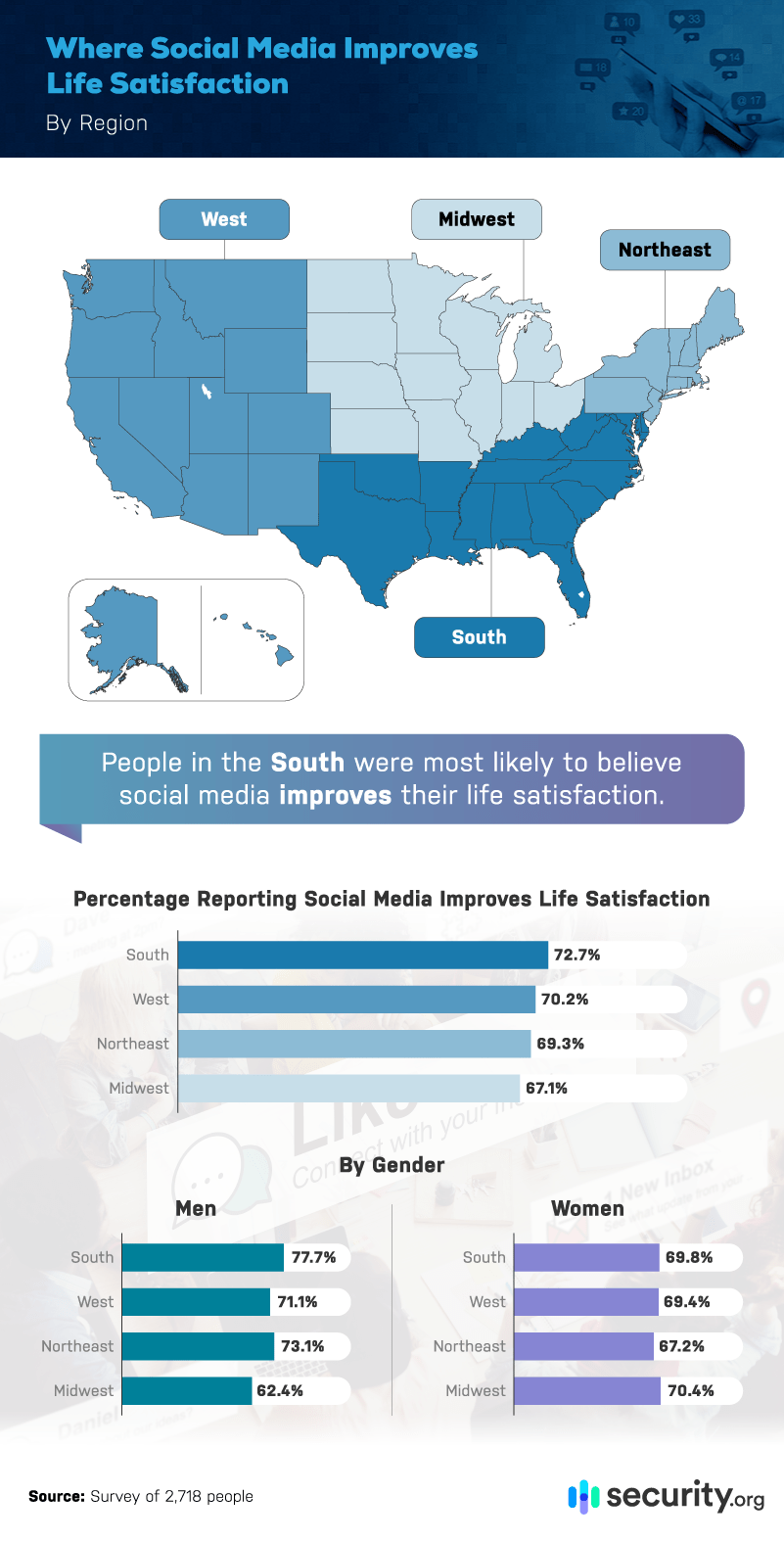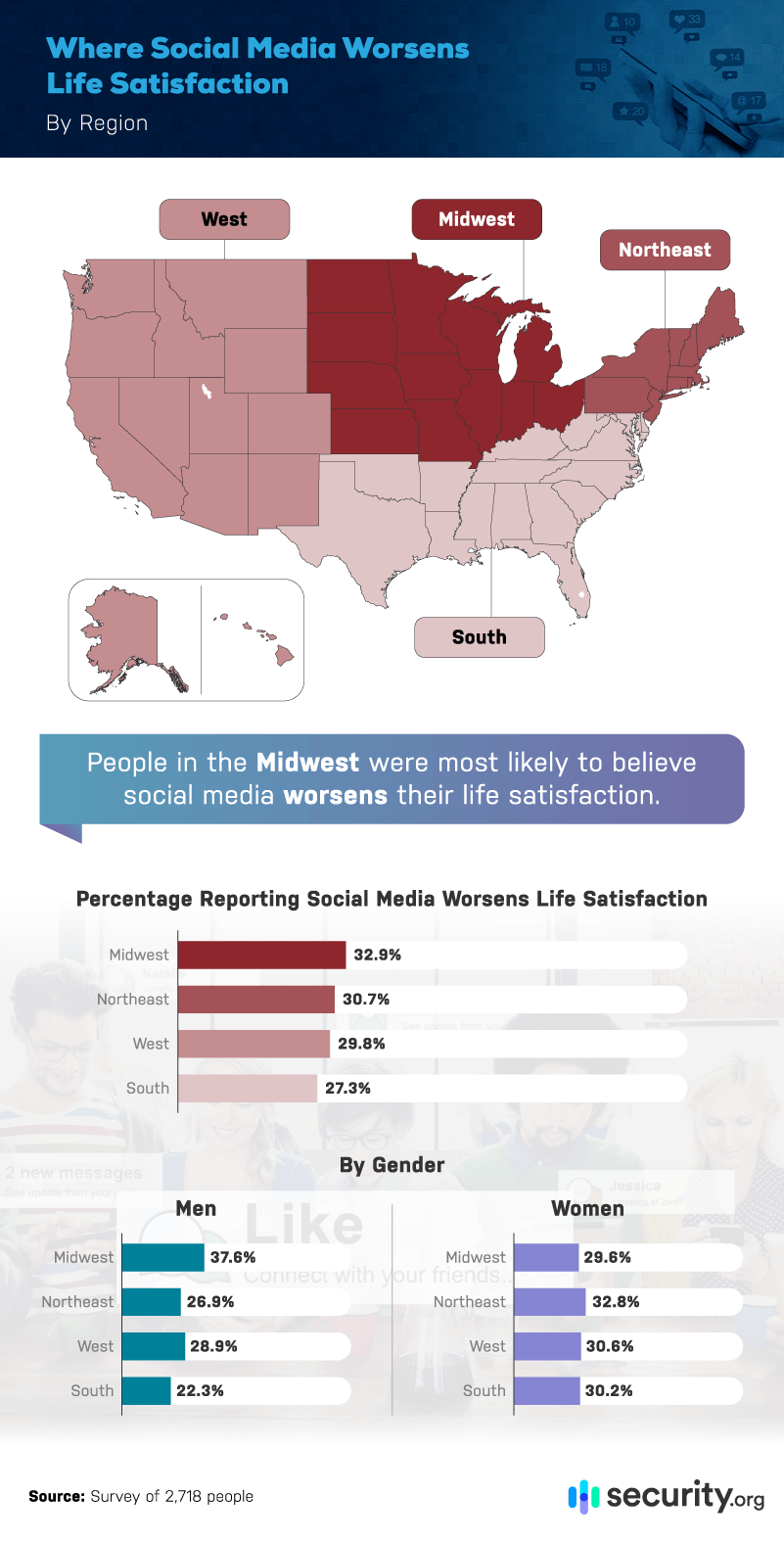Is Social Media Ruining Your Life?
Examining How Social Media Affects Life Satisfaction
Facebook, Snapchat, Instagram – oh, my! Nowadays, it seems like everyone is on social media. However, the positives of social media are often overshadowed by the seemingly endless negatives of the platforms. From addiction and mental health issues to jealousy and unhealthy comparisons, social media might be ruining our lives. This even causes some parents to want stricter legislation to protect kids on social media.
Those concerns multiply when you consider TikTok’s security concerns and Meta’s continuous privacy controversies, among issues with other major platforms. Users are increasingly questioning how much their personal information is worth. Want to learn more about people’s perspectives on their social media data value? Find out how 3,000 adults responded when we asked them “how much would you sell your social media data for?”
Despite headlines insinuating that this is a common sentiment, how many people actually think negatively of social media? We surveyed over 2,700 Americans about their digital habits and life satisfaction to see if social media is as bad as some say. Keep reading to see what we found.
>> Learn More: The Data Big Tech Companies Have On You
Satisfaction Guaranteed?
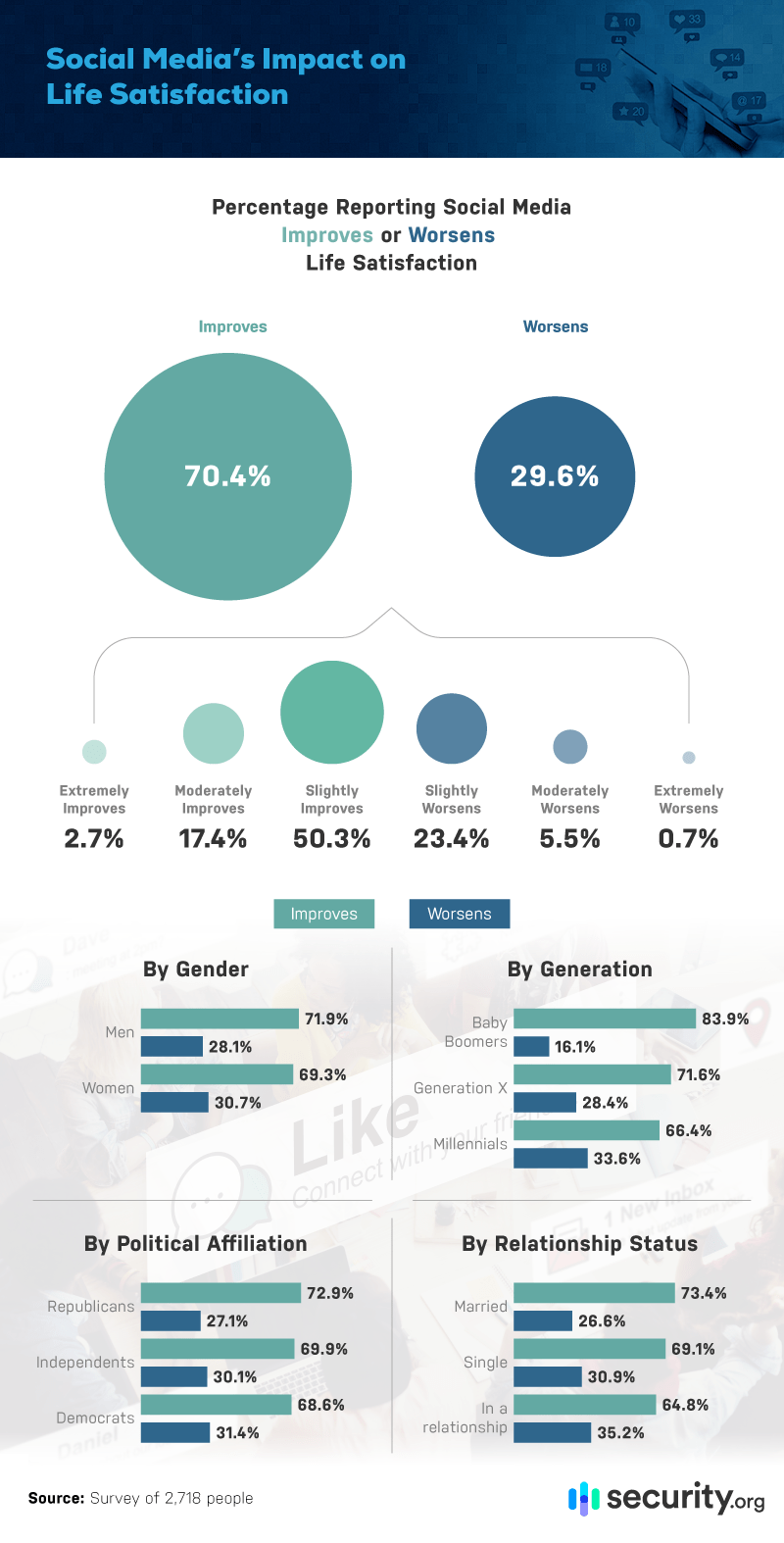
Research consistently shows that major social platforms – YouTube, Facebook, Instagram, Snapchat, and TikTok – are linked to cyberbullying, body image concerns, and FOMO (fear of missing out). They’re also associated with rising rates of depression and anxiety among However, when asked about the effects of social media, 70.4% of people said it improved their life satisfaction. But opinions – and negative consequences – weren’t equal for all.
FYI: Trying to stay informed to keep your kids safe from cyberbullying? Don’t miss our twenty crucial cyberbullying statistics for 2026.
While gender and political affiliation had little variation in opinion, millennials and people in a relationship were the most likely to think social media worsened their life satisfaction. Young people face particularly severe impacts from social media use. Recent data shows that teen depression rates have surged over the past decade, coinciding with the widespread adoption of smartphones and social With young adults being particularly sensitive to peer validation, it makes sense that their perceptions of social media would differ. This craving for social acceptance even causes some kids to partake in dangerous online challenges. We list the top 10 most dangerous online challenges so parents know what to look out for as their kids browse TikTok and other platforms.
For Better or Worse
Overall, those who claimed social media improved their lives were more likely to be men, baby boomers, Republicans, and from the South. Being married and having an associate degree also seemed to be linked to viewing social media in a more positive light. On the other hand, those who believed social media worsened their lives were more likely to be women, millennials, Democrats, and from the Midwest. Coinciding with their tendency to be younger, those with this negative belief were also more likely to be unmarried and have an incomplete college degree.
According to Pew Research data, women continue to dominate Facebook, Instagram, and Pinterest It also found that younger adults under 30 use virtually all social platforms at higher rates than those over 50. Interestingly, those who had completed some college were more likely to use Facebook and Snapchat more than those who stopped at high school or completed a college degree or higher.
Our World Without It
You might think the grass is greener without constant notifications, but when asked about living without social media entirely – most people weren’t ready to pull the plug. Nearly 60% of respondents said they would not prefer a society in which social media didn’t exist. Nevertheless, millennials and Republicans were the most likely to say they’d prefer a world without social media, with 43.9% and 45% saying so, respectively. People who were not in romantic relationships were least likely to report this in comparison to married people —nearly half of whom preferred a society without it.
Even among folks who said social media makes their lives worse, 36.6 percent still wouldn’t want to live without it. Meanwhile, nearly a third of people who believed social media improved their lives would actually prefer a world without it. This suggests they recognize the broader societal costs even while personally benefiting from these platforms.
Satisfied in the South
Social media’s impact varies across America’s diverse regions, reflecting different cultural attitudes and connectivity needs. Southerners topped the charts for believing social media enhanced their lives, while Midwesterners expressed the most skepticism. However, the Midwest was the only region in which women were more likely than men to think positively of social media – compared to 62.4% of Midwestern men, 70.4% of women in the Midwest said social media improved their life satisfaction.
Country of Consequences
Flipping sides entirely, people from the Midwest were the most likely to say social media worsened their life satisfaction, followed by those in the Northeast. While women in the South, Northeast, and West were more likely than their male counterparts to believe social media reduced their life satisfaction, men in the Midwest were more likely to believe this (41.2%).
The Midwest’s complicated relationship with social media doesn’t stem from lower quality of life. Southern states actually score lower on wellbeing metrics. For some users, social media serves as a digital escape from daily stresses, while others see the platforms themselves as something they need breaks from. This paradox highlights how context and community shape our digital experiences.
The Good, the Bad, and the Ugly
Let’s be real – social media is a double-edged sword. These platforms connect us with loved ones and help us discover niche communities. But they also bombard us with filtered perfection, endless comparisons, and algorithmic rabbit holes designed to keep us scrolling. Instagram’s carefully curated feeds set impossible standards, while TikTok’s beauty filters literally reshape how we see ourselves. Even when we don’t consciously notice these effects chipping away at our self-esteem and mental wellness, the impact accumulates.
Despite mounting research on social media’s psychological toll, most Americans still view these platforms favorably. Men, baby boomers, and those living in the South were more likely to see the positive sides of social media, but Americans, as a whole, thought that social media improved their life satisfaction. But even among people who thought it worsened their life satisfaction, a society without social media didn’t seem to be the answer.
Methodology
We collected responses from 2,718 American respondents. 39.9% percent of our respondents identified as male, while 60.1% identified as female. The respondents were primarily millennials, with 53% of respondents between the ages of 23 and 38, another 36% of respondents were between the ages of 30 and 54, 6% between the ages of 55 and 75, and 5% reported as above the age of 75. Survey responses were self-reported and are, therefore, limited by self-reporting biases.
Fair Use Statement
There are plenty of plus sides to social media – one of which is talking about its effects. If you’d like to share our findings on perceptions of social media, the content and graphics found here are available for non-commercial reuse. Just don’t forget to link back to this page to give the authors proper credit.

